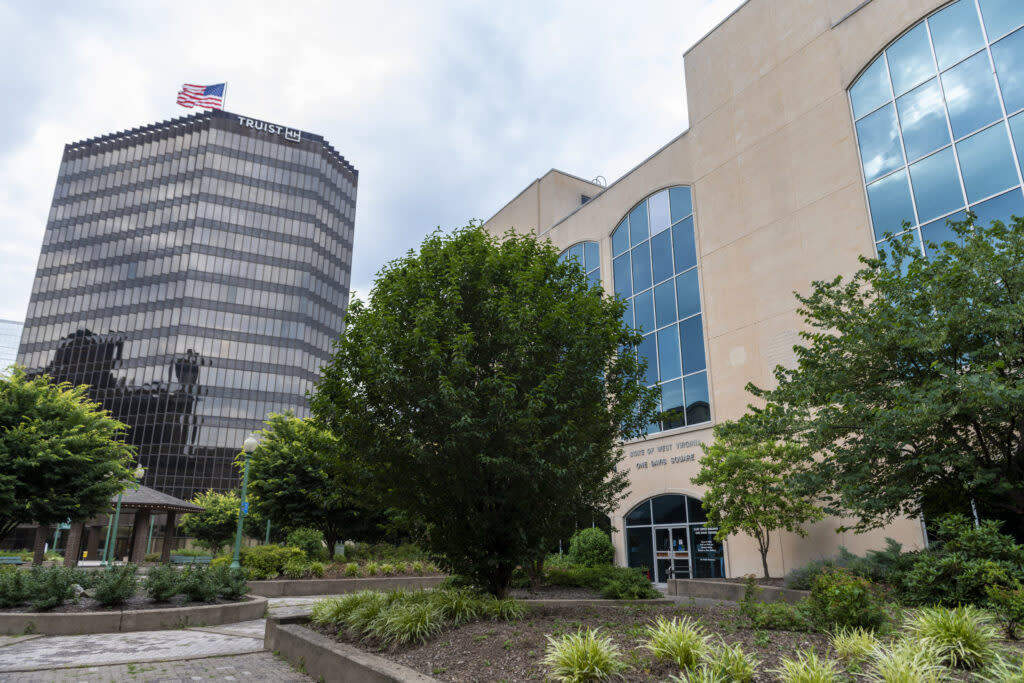Foster care lawsuit: State attempting to shield more docs from scrutiny, attorneys suing state say

The West Virginia Department of Health and Human Resources, located at One Davis Square in Charleston, W.Va. (Lexi Browning | West Virginia Watch)
Attorneys suing state officials over its troubled foster care system say the state is attempting to shield emails, documents and more that could shed light on how the state has responded to the crisis.
The West Virginia Department of Human Services — formerly part of the West Virginia Department of Health and Human Resources — has already been sanctioned this year for its role in failing to preserve emails from former top foster care officials related to the case.
West Virginia attorneys, along with New York-based nonprofit A Better Childhood, filed the lawsuit on behalf of children in 2019, alleging the mistreatment of thousands of kids in state foster care.
In new filings this month, the attorneys said that state officials requested deliberative process privilege to exempt at least 2,610 documents from being reviewed as part of the suit.
The privilege can allow records, including certain emails and policy drafts, to be withheld in the interest of protecting confidential information that could include decision making.
Additionally, attorneys said that DoHS did not specify why documents like news releases, meeting minutes and drafts about agency decision making could be shielded from the case. Instead, attorneys said, DoHS sent a log with “meaningless descriptions” of what was being withheld.
“Defendants should not be permitted to withhold documents nor prevent answers at depositions by asserting deliberative process privilege,” the plaintiffs wrote on June 13.
The foster care lawsuit was filed against state foster care leaders and Gov. Jim Justice.
Attorneys for DoHS and the governor’s administration argued that deliberative process privilege was necessary given the wide range of discussions staff had in emails about the child welfare system.
Subjecting those documents, including emails, to public scrutiny could create a “chilling effect” on staff and “would harm the process and integrity of executive decision-making,” they explained.
“Defendants have provided Plaintiffs with nearly 700,000 documents in response to Plaintiffs’ document requests, including tens of thousands of emails of public servants at high levels of the [DoHS] and the governor’s office, many of whom have key roles in policy development,” said attorneys for the state in a filing earlier this month. “Of these hundreds of thousands of documents, [DoHS] withheld only 2,610 documents on claims of deliberative process privilege, based on the individual review of each document.”
Additionally, Deputy Secretary of Children and Adult Services Cammie Chapman argued that some of her communications should be left out of the suit due to media coverage on West Virginia foster care.
“The child welfare system is subject to intense scrutiny by the media,” she wrote. “When DoHS personnel know that their internal deliberations could be splashed across headlines as part of decontextualized quotes — indeed, full contextualization would often require statutorily-protected information about specific foster children, families, or reporters — they are far less likely to be forthcoming about their ideas or to advocate their beliefs with candor.”
She added that the information could be “used to fuel ad hominem attacks in online media,” which could harm employees.
State lawmakers have accused DoHS of hiding how it cares for more than 6,100 children in state custody, including hundreds who reside out of state in facilities, hospitals or with family members.
Recently, media were stonewalled in their efforts to learn if Child Protective Services checked on a 14-year-old Boone County girl who was found emaciated. Police said they’d made a referral in the high-profile case a year prior to her death.
West Virginia has the nation’s highest rate of children coming into foster care. There aren’t enough foster homes to take care of children, and kids end up in hotels, motels, offices and cabins due to the shortage.
The state has implemented foster care reforms in recent years, like increasing pay for CPS workers. DoHS is also working to decrease the number of foster children who live in facilities, including ones that are out of state.
The state has unsuccessfully sought to dismiss the 2019 foster care suit and could pay possibly $172,000 in sanctions, according to fees requested by plaintiffs.
The post Foster care lawsuit: State attempting to shield more docs from scrutiny, attorneys suing state say appeared first on West Virginia Watch.

